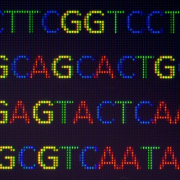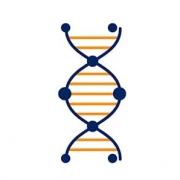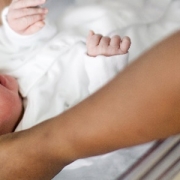Experts through experience: Dave’s story
As part of this year’s #GenomicsConversation, we spoke to 100,000 Genomes Project participant Dave about his first-hand experiences of genomic testing in the NHS
Dave McCormick joined the 100,000 Genomes Project in March 2017. He has a rare congenital condition called microphthalmia, which affects the development of the eyes and causes progressive sight loss. He received a clinical diagnosis as a child, but although the condition runs in his family the genomic basis for it is not yet understood.
On top of raising a family and working full time, Dave chairs the North West Genomic Medicine Service Alliance (GMSA) patient public voice panel, and is a participant panel advisor to Genomics England. We spoke to Dave about his first-hand experiences of genomic testing within the NHS, and the impact that testing has had on his life.
What expectations did you have when you joined the 100,000 Genomes Project?
There were two narratives going on at the same time. There was the public narrative, which was: it’s 2012, the 100,000 Genomes Project is launching, led by the then-Prime Minister David Cameron; some of the finest minds across the United Kingdom, certainly in England, are being brought together to develop a genome collection service and moving towards whole genome screening and testing.
At the same time, my internal narrative was more like, “Don’t get your hopes up, because we have been here before.” I’d been involved in other tests and initiatives, and I was advised by the brilliant genetic counsellor at the Royal Manchester Eye Hospital that it was a case of, “This is exciting, but it’s all still very new. So be patient.”
Have there been any surprises as you’ve gone through the process?
I think what I didn’t expect was the difficulties the NHS has experienced in moving towards a genomic medicine service. We need to recognise that it has not been an easy feat.
The sheer complexity of the IT ‘plumbing’, shall we say, involved in obtaining the data samples of 100,000 patients, plus conducting the necessary analysis and sharing the responses through the relevant GMSA, of which there are seven across England, has been a challenge.
I think, as with anything, until you’re actually going through that process, it’s very easy to say “We’re going to uncover the secrets to rare disease and cancers.” The reality check is to understand how the 3.2 billion base pairs of information operate and interact. To understand the genome, the RNA, the little bits in between that fix it all together, the proteins that sit behind that, it’s like a Russian doll! We are only beginning to peel away the layers of the onion and understand how they all fit together. We will get there eventually, but it will take time.
What advice do you have for others considering genomic testing?
First, I encourage the individual to be clear on the why: why do you want the test? It may be pure curiosity, and that’s entirely reasonable and understandable.
In my case, it was because I needed to understand not just for me, but for my young family. I wanted to ensure that my children were armed with as much information as possible.
I think the second bit of advice I would give is that you need to be aware of additional findings. Your test may bring up information about your genome that has nothing to do with the condition or symptoms you were being tested for. It may be that you just want to find out about your condition and nothing else, and that’s fine, but be mindful of the fact that you will have the option to find out about anything additional that comes up.
I don’t mind sharing that I’ve ticked the additional findings box, because I’m very curious. But a lot of the feedback that’s provided is in terms of percentages, probabilities. There are very limited absolutes.
Has going through the process of genomic testing made a difference to you?
Yes, it’s made a huge difference to me. I’ve not got the molecular diagnosis yet, I’m still waiting for that. However, it’s given me the opportunity to occupy this amazing space, this privilege of being a patient participant advisor, both nationally and regionally, and it’s led me to the work I’m doing in the North West GMSA.
It’s been great to have the opportunity to represent, support and develop the voice of the patient and to make sure that we are all heard. The work of the researchers and the clinicians is very important, but equally, the patient voice and the lived experience of the patient is essential.
I’ve also had the honour of developing new ways of engaging with the different communities of researchers, clinicians and patients using webinars and podcasts. Being able to hear patients’ stories is really powerful because it means that I’m not on my own. Everybody’s journey is different, but there are a lot of similarities.









